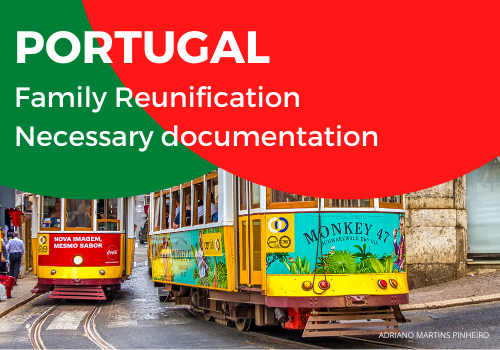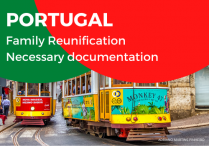Applying for residence in Portugal
For living in Portugal and family reunification
Documents required
Application for residence card is scheduled and submitted by the holder of the right to family reunification.
Necessary documentation as follows:
- Two recent, identical photographs, in colour with blank background, and easily identifiable (only for appointments at Odivelas, Aveiro or Braga SEF bureau);
- Documentary proof certifying the entitlement to Family Reunification by a foreign citizen holder of a Residence Permit, an EU Blue Card, or the long-term resident status;
- Authenticated supporting documents proving the family links invoked;
- Authenticated copies of the identification documents of the applicants family members;
- Evidence that the applicant has adequate accommodation (not applicable to refugees);
- Documentary evidence of adequate subsistence means for the applicant and for the family, as per the provisions of Order number 1563/2007, of 11/12 (not applicable to refugees);
- Extract from the judicial record in the country of origin or of provenance of the family member (where the family member has been residing for a period exceeding one year) except for under 16 years old.
SPECIFIC DOCUMENTS
- Certificate of incapacity of children of age, in case of dependent children of age;
- Certified copy of adoption decision, as well as a certified copy of the acknowledgement of the decision by the national authority, where applicable;
- Full Birth Certificate, documentary evidence of economic dependence and document supporting the enrolment in a Portuguese teaching establishment, in case of children who are of age, single and dependent;
- Documentary evidence of economic dependence by first-degree relative in the direct ascending line, under the age of 65;
- Certified copy of the custody decision, as well as a certified copy of the acknowledgement of the decision by the national authority, where applicable, for cases involving minor siblings
- Written authorization by a non-resident parent, certified by a Portuguese consular authority, or copy of court decision giving legal guardianship of a minor child, or the custody of an incapacitated person to the resident or to the respective spouse, where applicable;
- Circumstantial evidence of Unmarried Partnership, as provided for in Article 2-A of Act number 7/2001, of 11 May, as amended by Act number 23/2010, of 30 August, together, where possible, by other circumstantial evidence of the unmarried partnership relevant to the purposes of Article 104, paragraph 2 of the Aliens Act.
NOTES
The granting of a residence permit shall entail: the absence of any fact which, if known to the competent authorities, would preclude the granting of the visa; Absence of conviction for a crime which in Portugal is punishable by a custodial sentence of more than one year; The applicant is not within a period of prohibition of entry into the national territory, following an expulsion measure from the country; No indication in the Schengen Information System; No indication in SEF’s Integrated Information System for non-admission purposes, under article 33 of the Aliens Act;
After decision of the application for family reunification, SEF shall inform the Ministry of Foreign Affairs for the beginning of the process of residence visa within its consulate.
After entering into national territory with a residence permit, the family member of the applicant shall require within SEF the residence permit under article 107 of Law no. 23/2007 of 4 July, as amended.
The family member holding a visa issued under article 64 of the Aliens Act, or who is in the national territory to which the application for family reunification has been accepted, is granted a residence permit of duration identical to the residents. The family member holding a permanent residence permit is issued a renewable residence permit for three years under the amendment introduced to article 75 of the Aliens Act, by article 192 of Act n.º 75-B/2020, of 31 december, valid (at first) for two years. Two years after the issue of the first residence permit and in as much as there are family ties or, regardless the mentioned deadline, whenever the holder of the right of family reunification has underage children living in Portugal, the members of the family have the right to an autonomous permit, valid for three years, and renewable, under the amendment introduced to article 75 of the Aliens Act, by article 192 of Act n.º 75-B/2020, of 31 december. The first residence permit granted to the spouse under the family reunification is autonomous whenever he/she is married for more than five years with the resident – valid for two years, renewable for three, under the amendment introduced to article 75 of the Aliens Act, by article 192 of Act n.º 75-B/2020, of 31 december.
- The following family members, in accordance to Articles 99 and 100 of the Aliens Act are entitled to family reunification:
- The spouse;
- Underage or incapable children under guardianship of the couple or of one spouse;
- Minors adopted by an unmarried applicant, by a married applicant or by the spouse, following decision taken by the relevant authority of the Country of origin, provided that legal framework incorporates the same rights and duties of natural affiliation and provided that decision is acknowledged by Portugal.
- Children who are of age, and of whom the couple or one of the spouses is in charge, and study in a Portuguese teaching institution.
- Children who are of age, and of whom the couple or one of the spouses is in charge with, single or studying, whenever the holder of the right of reunification has a residence permit granted under article 90 – A.
- First-degree ascendants in the direct line to the resident or the respective spouse provided they are dependent on either of them
- Underage siblings under custody of the resident, following decision by a relevant authority in the country of origin, as long as that decision is acknowledged by Portugal
- The following family members of unaccompanied minors are also entitled to family reunification:
- First-degree ascendants in the direct line;
- His / her legal guardian or another family member, if the refugee has no direct ascendants or if it proves impossible to trace them.
- For purposes of family reunification with a beneficiary of a Residence Permit for study, unremunerated professional training or voluntary work are entitled the following family members:
- The spouse
- Underage or incapable children under guardianship of the couple or of one spouse;
- Minors adopted by an unmarried applicant, by a married applicant or by the spouse, following decision taken by the relevant authority of the Country of origin, provided that legal framework incorporates the same rights and duties of natural affiliation and provided that decision is acknowledged by Portugal.
- Civil partnership – Family reunification may be authorized with:
- A non-marital legally recognized partner of the resident, irrespectively of whether the partner is inside or outside national territory;
- Underage or incapable children, including children adopted by the legal partner, provided these children are under their guardianship.
- Documents written in a foreign language must be accompanied by the respective translation that can be certified by any of the entities listed in Notaries Code, namely: Portuguese Notary; Portuguese Consulate in the country where the document was passed; Consulate of that country in Portugal.
SCHEDULING APPOINTMENT BY TELEPHONE
PHONE: 217 115 000 | MOBILE: 965 903 700
LAW | ARTICLE 98, PARAGRAPH 1 – FAMILY REUNIFICATION
Website SEF
https://advocaciapinheiro.com/



